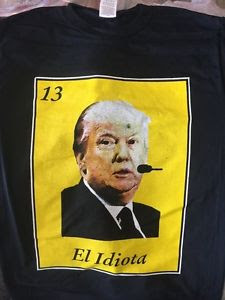The Trump Doctrine: “We Want Deal”
The Trump Doctrine: “We Want Deal”
“We must take real
care about this, as a message of hate is quickly spreading and winning adepts
on our neighbor’s country.”
Erreh Svaia
By: Evan Osnos
Taken From:|The New Yorker
On Tuesday,
in Dubuque, Donald Trump, the front-runner for the Republican Presidential
nomination, took a break from his frequent warnings about the threat posed by
criminals from Mexico to reflect on his experience with another part of the
world. “Negotiating with Japan, negotiating with China, when these people walk
into the room, they don’t say, ‘Oh, hello, how the weather, so beautiful
outside is, isn’t it lovely?’ ” Trump told the crowd. He adopted a
broken-English accent. “They say, ‘We want deal.’ ”
Trump’s
fear of Asians taking advantage of Americans, though not as well-known as his
suspicion of Mexican criminals, has a long history. In 1987, he ran an ad in
three newspapers, calling for “a little backbone” in U.S. foreign policy. “For
decades,” it said, “Japan and other nations have been taking advantage of the
United States.… Let’s not let our great country be laughed at anymore.” An aide
at the time, John R. O’Donnell, later wrote that the ad was “tailored to
blue-collar resentments over the trade deficit and to rally Middle America
against the machinations, real or supposed, of our foreign allies.” In 2012,
Trump updated his view of Asians with a comment about his belief that climate
change is a hoax. He tweeted, “The concept of global warming was created by and
for the Chinese in order to make U.S. manufacturing non-competitive.”
Trump’s
range as a performer is often described as vaudevillian, and that description
should be applied to his world view as well. He often appears to be reenacting
conversations about other countries that took place a century or two ago. When
he talks about Mexico “sending people that have lots of problems,” including
drugs, crime, and “rapists,” he echoes Francis Walker, the administrator of the
1870 and 1880 censuses, who described new arrivals as “beaten men from beaten
races, representing the worst failures in the struggle for existence.” Or
Senator Pat McCarran, the Nevada Democrat, who told his colleagues in 1953 that
they must be wary of “hardcore, indigestible blocs which have not become
integrated into the American way of life, but which, on the contrary are its
deadly enemies.” McCarran warned, “Today, as never before, untold millions are
storming our gates for admission, and those gates are cracking under the strain.”
The quota system that he favored remained in place until 1965.
Since
Monday, when I published a piece on Trump’s popularity with white nationalists
and anti-immigration activists, events have moved rapidly. At a news conference
in Dubuque, Trump ejected Jorge Ramos, the most influential Latino news anchor,
when Ramos tried to ask a question without Trump’s approval. “Sit down. Sit
down. Sit down,” Trump scolded him, before signaling to his security team, who
forcibly removed Ramos from the room. Trump said, “Go back to Univision.” While
Ramos was in exile in the hallway, a well-dressed man in a suit jacket, wearing
a Donald Trump sticker, approached Ramos (who is a U.S. citizen), and said,
“This is not about you. Get out of my country.”
Trump, ever alert to when he is losing a room, later permitted Ramos to
rejoin the group, and they had an awkward debate.
A few days
earlier, Trump received generous praise from David Duke, the former grand
wizard of the Ku Klux Klan. Though Duke was initially skeptical of Trump, he
had become a believer. “Trump, he’s really going all out. He’s saying what no
other Republicans have said, few conservatives say. And he’s also gone to point
where he says it’s not just illegal immigration, its legal immigration,” Duke
said on his radio show. He urged his listeners to support Trump because it was
a “great opportunity.” “So he’s certainly the best of the lot. And he’s
certainly somebody that we should get behind in terms, ya know, raising the
image of this thing.” When Trump was asked, on Bloomberg television, about the
support that he has received from Duke and other white nationalists, he said,
“I don’t need his endorsement; I certainly wouldn’t want his endorsement.”
Asked whether he would repudiate it, Trump said, “Sure, I would if that would
make you feel better.”
By now,
it’s well known that Trump’s strategy of emphasizing racial and ethnic
divisions contradicts the way that the Republican establishment had hoped to
run the 2016 race, but, as Trump’s lead has grown—defying predictions that he
would peter out—disagreement from within the Party has given way to a kind of
despair among traditional Republicans. In the Washington Post this week, George
Will wrote, “Every sulfurous belch from the molten interior of the volcanic
Trump phenomenon injures the chances of a Republican presidency.” Will ran
through a possible arithmetic of defeat: in 2012, Mitt Romney lost non-white
voters by sixty-three points. He had relied almost exclusively on white
voters—they were ninety per cent of his support—and next year the white
percentage of the electorate will be two points smaller than in 2012. Will
wrote, “Romney did even slightly worse among Asian Americans—the
fastest-growing minority—than among Hispanics.”
In
returning to a primordial American politics, Trump has fortified his primary
campaign and attracted the admiration of Duke and others who hear in his
message a return to the past. In the next fifteen months, that approach may
collide with the arithmetic of modern American politics, and Trump will face a
strategic decision. But, for the moment, he remains consistent, and faithful to
the political credo of Roger Stone, the former Nixon aide who has advised Trump
over the years (and who left the campaign earlier this month). Stone likes to
say, “Hate is a stronger motivator than love.”



Comments
Post a Comment